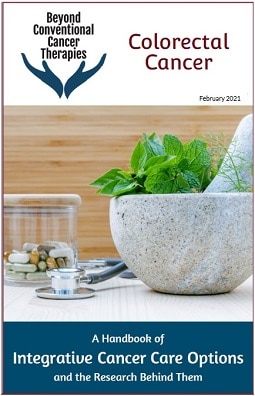Handbooks for cancer types
📩 Subscribe to our weekly newsletter and receive the Cancer-Fighting Kitchen ebook free of charge.
Additional handbooks are in development. In the meantime, explore these handbooks from our predecessor site, Beyond Conventional Cancer Therapies:
Colorectal cancer

Ovarian cancer

Resources for other cancer types
Brain cancer
Pangal DJ, Baertsch H et al. Complementary and alternative medicine for the treatment of gliomas: scoping review of clinical studies, patient outcomes, and toxicity profiles. World Neurosurgery. 2021 Jul;151:e682-e692.
Gynecological cancer
Ben-Arye E, Samuels N, Lavie O. Integrative medicine for female patients with gynecologic cancer. Journal of Alternative and Complementary Medicine. 2018 Sep/Oct;24(9-10):881-889.
Lung cancer
Frenkel M, Slater R, Sapire K, Sierpina V. Complementary and integrative medicine in lung cancer: questions and challenges. Journal of Alternative and Complementary Medicine. 2018 Sep/Oct;24(9-10):862-871.
Pancreatic cancer
Frenkel M, David A, Sapire K, Hausner D. Complementary and integrative medicine in pancreatic cancer. Current Oncology Reports. 2023 Mar;25(3):231-242.
Find complementary therapies for specific cancer types
Your support helps us expand evidence-based resources on whole person cancer care. Give today and empower healing for people with cancer.
